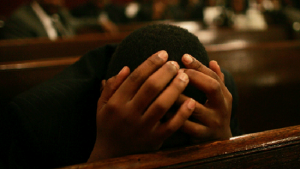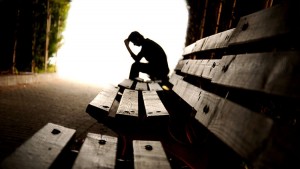One description of depression is that it is like the shapeless sagging of a rubber band that has been kept tight and taunt for too long. When feelings have been strong, stressed, unprocessed, or held captive over a period of time, we just stop feeling altogether. Persons and events no longer have the power to enliven us; we operate on a low level cruise control. Usually we keep functioning, but there is no positive or creative affect toward persons and things, and even less toward ourselves. We basically stop living our only life.
Many lawyers operate at this level, without even knowing that it is a kind of death. They have learned to take it as normative and unchangeable. Life is no longer enjoyable, and almost everything becomes another excuse to be upset, angry, aggressive, afraid or defensive. We all know many people who live at this level.
But I would also like to describe another common source of depression that is less often addressed: basic meaninglessness. Religion, philosophy, and culture are supposed to address that foundational need. But when religion or spirituality is largely in the head, mostly fear based, or merely moralistic, there is a huge vacuum in most people. The soul and the spirit are not fed at this level. I am afraid that it is the most common form of religion we now have in the West. Such people, often very smart, have no beginning, middle or end to their life story, unless they totally create it for themselves like some kind of Nietzschean “ubermensch”. This is inherently too big a task for one autonomous individual.
The “Is that all there is?” feeling overcomes most people in our culture somewhere in their mid to late forties, if they are at all typical. If you are riding a fast track of upward mobility, external success, and lots of control, you might be able to put it off for another decade. But it is hardly worth it, because then the patterns of avoidance, depression, splitting off, a basic non-intimacy with one’s deepest life, are so entrenched, that it is very hard to emotionally and intellectually change without a lot of grace – – and a lot of “grit your teeth” and try to bear it. We are largely unteachable at that point.
The grace, of course, will always be available, but often we have lost the recognition of it, the desire for it, the trust in it, and the ability to cooperate with it. We do not even know there is such a thing as grace (Acts 19:3), and it is indeed an “it” instead of a Presence, a power and a possibility. In fact, for an ego that has been in overdrive for forty years, the reception of grace will actually feel like a defeat, a humiliation, and a failure. If “I” have been doing it all along, any “we” experience of union and cooperation with Another will actually feel like a loss of control and a loss of self-importance. It will be like switching from an eager breast stroke to a back float, and still having to assume that I can still get there. That would be hard for any successful lawyer, and actually for any of us.
At this point, one’s overdeveloped faculties (rational mind, willpower and Yankee can do!) will have to give way to those that were left underdeveloped for the sake of what we call in men’s work “building our tower”. What do I mean by those “underdeveloped faculties”? Well, first of all, I should state that they are not just underdeveloped; they are actively rejected and denied as values at all. I think that is why religion tended to speak at this process as “conversion”. Because if it is authentic, it is a rather complete reversal (“convertere” in Latin) of previously held virtues and values. Probably also why authentic religious conversion is rather rare.
Okay, here goes. This is what changes. Things like admitted powerlessness begin to be admired over claims to power, unknowing over knowing, living without resolution over demanding closure, giving instead of taking, waiting instead of performing, listening instead of talking, letting go instead of collecting and hoarding, empathy with instead of domination over. The more traditional words that were used for these values were three: “Faith”, “hope”, and “charity”. What St. Paul says, “are the only things that last” (1 Corinthians 13:13). I am sure he is right. But, mind you, these are virtues that are only learned by many trials and many errors by the second half of life, at best. In the first half, they actually do not make sense. The trouble is that many lawyers in our secular world are not moving to the second half of life. They are becoming elderly but they are not elders.
At first you will not know where to turn, especially if you have a good mind, and you are used to explaining everything and determining your own direction. You have no practice at this different set of virtues. To be honest, only God can lead at this point. You had best give up, because all of your previous tools are useless and even counter- productive. This is exactly why Bill Wilson made the first necessary step of Alcoholics Anonymous the absolute admission of “powerlessness”. This is about as counter intuitive as you can get, or even seemingly non-rational (not irrational!).
So what am I proposing that you do? Really, not that much. I am first of all trusting in your ability to hear some of what I just tried to say. If you have persisted in reading this far, you are hearing me at some non-resistant level. We call this the “contemplative mind”, where you turn off the need to be right or wrong, agree or disagree, and just let something work on you at whatever level of truth there is. (Everything Belongs, Crossroad Press, 1999). The Eastern religions would call it non-dual thinking.
Secondly, I would encourage you not to try too hard, no self-assertion because that will only deepen your addiction to your own way of doing life. You will try to “convert” yourself by yourself, which is actually a oxymoron. If you try to be heroic and superior, you will only get more of the same, but now disguised with a religious or moral sugarcoating. Please trust me on this one, all great spirituality is about letting go. YOU cannot do it. IT is done unto you.” (Luke 1:38 and 28:43). You are always the allowing. Someone else is winning at this point, and you are getting your first lesson in creative losing.
Thirdly, I would like you to forgive yourself for your life’s mistakes. God never leads by guilt or by shaming people. Take that as an absolute. God always leads the soul by loving it at ever deeper levels, and if you want to be led, you absolutely must allow such unearned love. Like all grace, it will feel like losing, not gaining, surrendering not taking, trusting not achieving, allowing instead of “making the case.” Like all authentic conversion it will feel like dying (See John 12:24 or Old Adams’ Return, Crossroad, 2005), but it will really be living. Fully, for the first time. God does not love you if you change; God loves you so that you can change. God is not the rewarder and the punisher. God is the energy itself; more of a verb than a noun, according to the great mystics.
This is one case you are not going to be able to win. In fact, I am convinced that the Gospel of Jesus really is the hope of the world precisely because it totally levels the human playing field. Now we win by losing, and if we are honest, we all have lost, failed, and been untrue at some levels (Romans 5:12). That humiliating recognition is the hole in the soul that allows God to get in – – and ourselves to get out – – of ourselves. Don’t miss such an entrance or exit. It is the Big One.
Fr. Richard Rohr is a Franciscan priest in New Mexico Province and author of several books including Hope Against Darkness and From Wild Men to Wise Men: Reflections on Male Spirituality. He is the founder of the Center for Action and Contemplation in Albuquerque, New Mexico.













